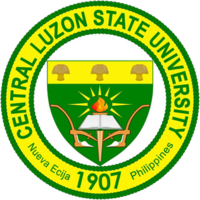Central Luzon State University
| Pamantasang Estado sa Gitnang Luzon | |

The CLSU Seal
|
|
| Latin: | |
|
Former names
|
Central Luzon Agricultural School (1907), Central Luzon Agricultural College (1954) |
|---|---|
| Motto | Where Difference is Created |
| Type | State University |
| Established | 1907 |
| President | Tereso A. Abella |
| Students | 10,000 |
| Location |
Maharlika Highway, Muñoz, Nueva Ecija, Philippines 15°43′58″N 120°55′52″E / 15.7326606°N 120.9309769°ECoordinates: 15°43′58″N 120°55′52″E / 15.7326606°N 120.9309769°E |
| University Hymn | CLSU Hymn |
| Colors | Green and Yellow |
| Nickname | CLSU Green Cobras/Lady Cobras |
| Affiliations | Accrediting Agency of Chartered Colleges and Universities in the Philippines |
| Website | www |
Central Luzon State University (CLSU) is a state university on a 658-hectare campus in Muñoz, Nueva Ecija, Philippines. It is the lead agency of the Muñoz Science Community and the seat of the Regional Research and Development Center in Central Luzon. To date, CLSU is one of the premiere institutions for agriculture in the Philippines and in Southeast Asia known for its research in aquaculture, ruminants, crops, orchard, and water management. It has also been placed between the sixth and the twenty-first spot for the most academically-excellent university in the country for various years, overwhelming most schools in Metro Manila. It has been placed in the 100 most significant schools is Asia numerous times as well.
CLSU is the first comprehensive state university to undergo institutional accreditation. It is a declared Cultural Property of the Philippines with the code of PH-03-0027 due to its high historical, cultural, academical, and agricultural importance to the nation.
Central Luzon State University is in the Science City of Muñoz, Nueva Ecija, Philippines. It started as a farm school and in 1907 became Central Luzon Agricultural School (CLAS) with the intention of promoting agriculture and mechanics arts. Later, it included the promotion of homemaking arts among its commitments.
In 1954, CLAS was converted into Central Luzon Agricultural College (CLAC) with the mission of promoting agricultural education. In 1964, it was elevated to a university — the Central Luzon State University — to provide advance instruction and technical and professional training in agriculture and mechanics arts, and promote research, literature, philosophy, sciences, technology and arts. Over the years, CLSU has been known as an agriculture-oriented institution.
In April 2007, CLSU celebrated its centenary.
Today, it has transformed into a comprehensive university offering undergraduate and graduate courses. Lately, it has been designated as a zonal university in Luzon as one of the more respected institutions of higher learning in the Philippines.
The university is the lead agency of the Muñoz Science Community and the seat of the Regional Research and Development Center in the Central Luzon. To date, CLSU is one of the premier institutions of agriculture in Southeast Asia known for its breakthrough researches in aquatic culture (pioneer in the sex reversal of tilapia), ruminant, crops, orchard, and water management researches.
...
Wikipedia
